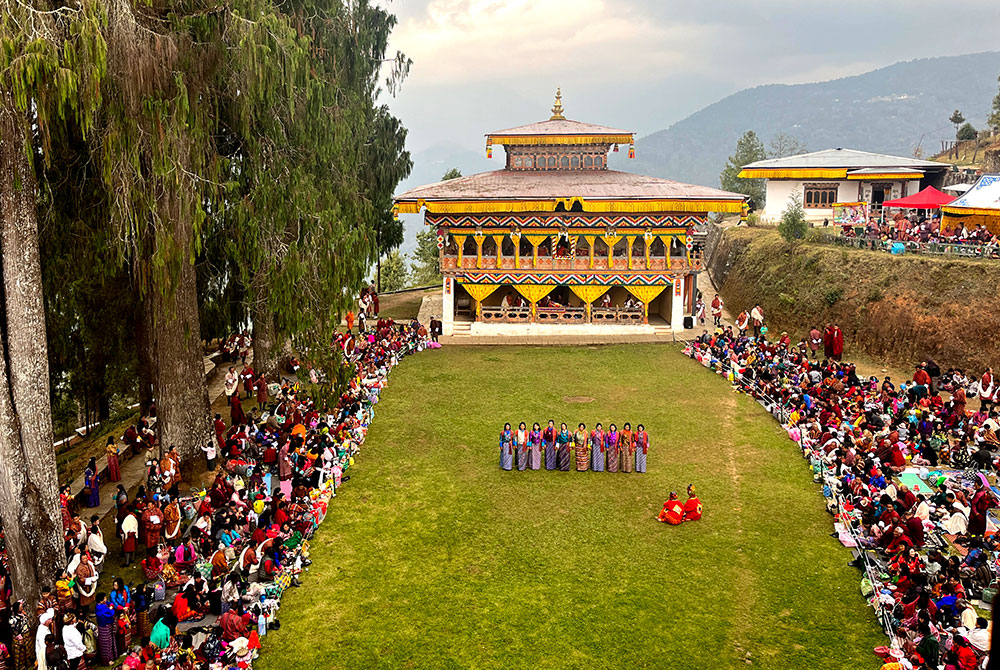Chencho Dema
In the secluded hamlet of Talo, nestled amidst the serene mountains, lies a tradition as old as time itself – three songs known as Manisum. The three Shungdas are not mere songs, they are ancient and sacred to the Talo community if not a connection to the ancestors, a celebration of heritage, and a source of spiritual solace.
The significance of Manisum comes alive during the Talo Tshechu, a festival where these sacred songs are performed exclusively by group of women dance troupes. A lead singer is selected to carry on the tradition.
The Manisum is meticulously hand-written on ancient scrolls and has been passed down through generations, with no alteration to its tune or lyrics are registered as a property of the Talo monastery.
Of the three songs, Samyeki Salang is performed on the first day believed to have been originally composed to celebrate the construction of the Talo temple, which is regarded as a replica of Samye, the first Buddhist monastery of Tibet built in the 8th century.
Drukpai Dungye is performed on the second day which narrates the story of the Zhabdrung Lineage followed by Thowachi Gangi Tselay on the third and final day which serves as a song of gratitude.
However, beneath the surface of this cultural celebration, a quiet concern lingers.
With an increasing number of youths from Talo migrating to urban centers in pursuit of education and employment opportunities, there is a fear among the village elders that this age-old tradition may fade away with the passing generations.
A distinctive aspect of the Talo Zhungdras is that only residents of Talo, known as Talops, are permitted to learn the songs.
Wangchuk, a 66-year-old who coordinates the mask dances and dances during the Tshechu, expressed that while the concern is present and residents do fear its potential disappearance over time. “It is difficult to get the dancers but somehow we have been managing,” he said.
He said that unlike in the past when women typically did not attend school or relocate elsewhere, modernization has led youth to seek greener pastures elsewhere. “Despite efforts to preserve traditions, it’s increasingly challenging to prevent them from seeking new opportunities elsewhere, he added.
Another resident said that some of the dancers are employed and reside outside the village. “They must arrive days prior to the Tshechu for rehearsals, but obtaining leave from work can be challenging. However, if they are allowed to travel for the dance during the festival, this issue could be resolved,” he said.
Locals said that the women in the dance troupe must refrain from sexual intercourse three days prior to the Tshechu and the practices start 16 days before the Tshechu as it is difficult to master and rehearsals are required even for those who perform it every year.
Additionally, dancers are required to spend the night allocated to them in the monastery and are not permitted to return to their homes during that time.
Wangchuk said Manisum was composed by Meme Sonam Dhondup, the grandfather of Zhabdrung Jigme Chogyal (1862-1904), the fifth mind reincarnation of Zhabdrung Ngawang Namgyel.
Also known as Kusho Drametse, Sonam Dhendup was a prominent figure in his era, credited with overseeing the composition of the Talo songs and orchestrating their formal introduction and arrangement for Talo’s festival proceedings.
Following its integration into the festival during Zhabdrung Jigme Norbu’s era, his successor and grandnephew, Jigme Chogyal, bolstered the legacy by actively promoting the songs and formalizing them as integral components of the Tshechu program.
According to local oral traditions, in the past, the songs were exclusively performed during the festival and strictly adhered to traditional styles.


